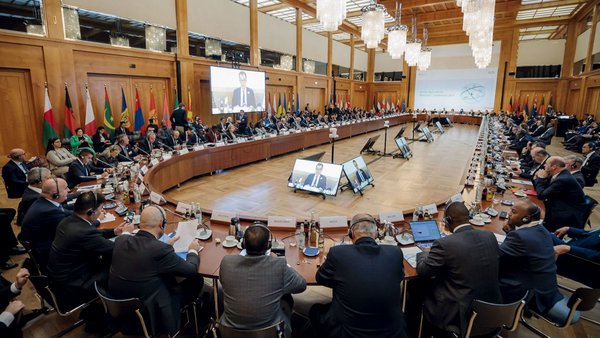 Read this article in French
Read this article in French- Share this article
- Subscribe to our newsletter
Designing crisis-proof food systems
Some 70 ministers of agriculture from all over the world came together at the 15th Berlin Conference of Agriculture Ministers in January 2023. Along with representatives from more than ten international organisations, they discussed how to implement the right to food worldwide. In their final declaration on the main theme of the conference “Transforming food systems: A global response to multiple crises”, the ministers made a commitment to promoting sustainable, inclusive and crisis-proof food systems. The participants also pledged to make food available, affordable and safe for all in order to achieve the UN goal of Zero Hunger as part of the 2030 Agenda.
The German Federal Minister of Food and Agriculture, Cem Özdemir, stressed that humanitarian aid was essential, but it only helped in the short term. “While war and the climate crisis inflict major damage in the blink of an eye, it takes time to cultivate land. We need to move away from short-term crisis hopping. Our support must have a long-term impact. That is why we need to strengthen agricultural development worldwide, and focus on long-term solutions. We need to build grain silos, not send sacks of grain.”
Key outcomes of the 15th Berlin Conference of Agriculture Ministers
- Creating sustainable and resilient food systems: The aim is to promote crisis-proof food systems that are both sustainable and resilient. This includes ensuring that agriculture is economically viable for agriculture and decent working conditions. In particular, family farmers, smallholders, women, youth, and indigenous and vulnerable groups must be supported. The building blocks are the reduction of food waste and loss, rule-based trade, sustainable supply chains, and supporting locally adapted farming and greater diversity.
- Fostering climate-friendly food systems: In addition to meeting the 1.5-degree target and supporting the COP27 targets for agriculture, greenhouse gas emissions must be reduced through the sustainable management of soils, nutrients and livestock. There is a need to help adapt agriculture to climate change. This includes reducing energy consumption in the agricultural sector.
- Promoting the conservation and sustainable use of biodiversity: Functioning food systems depend on the preservation of biodiversity. Soil health and agroecology must be enhanced in order to improve genetic diversity and agrobiodiversity. More efficient use is to be made of fertilisers and pesticides in order to reduce soil and water pollution. Deforestation and desertification must be prevented.
- Improving collaboration for sustainable global food systems: Important governance issues for securing the world’s food supply are to be introduced into the discussion process. Furthermore, the results of the Conference of Agriculture Ministers are to be incorporated into the process of the UN Food Systems summit. The UN Committee on World Food Security (CFS) is also to be strengthened, as is cross-sectoral collaboration on the One Health approach.
(BMEL/ile)
Read more on the BMEL website





Add a comment
Be the First to Comment